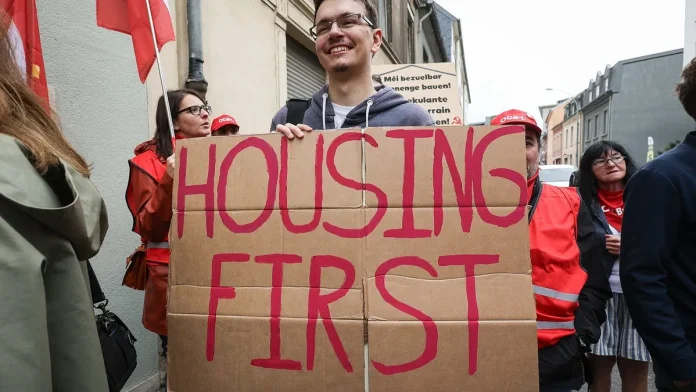Mortgage rates are rising by leaps and bounds while construction costs have soared by 85,000 euros ($90,000) in Germany, signalling perhaps Europe’s worst construction crisis in decades, according to Bloomberg.
A similar problem is unfolding across most of the European continent. Residential construction has collapsed due to escalating costs, and increasingly stringent energy efficiency regulations are only exacerbating the situation. It threatens to stifle economic growth and further aggravate political tensions as the housing shortage strongly influences voter opinion.
The most affected countries are among the wealthiest. The number of building permits in France fell by 28 per cent in July.
New construction permissions in Germany fell by more than 27 per cent in the first half of the year. Affordable housing was one of the key commitments made by Chancellor Olaf Scholz’s ruling coalition when it took power in 2021. However, economists estimate that the government will not meet its target of building 400,000 new homes annually until at least 2026.
UK housebuilding is expected to fall by more than 25 per cent this year. Housing construction has consistently fallen short of the 300,000 homes a year target set by the ruling Conservative government in 2019.
Sweden is suffering its worst decline since the 1990s crisis, with construction rates at less than a third of what is considered necessary to meet demand. Sweden has a constitutional obligation to provide affordable housing, but the supply of rental flats has not matched demand for decades, pushing up house prices and forcing people to sublet on the black market.
The downturn is affecting single-family homes as well as large housing projects. Vonovia SE, Germany’s largest landlord, has postponed all new construction indefinitely this year.
Such a situation means that governments are failing to fulfil promises made to voters. Kolja Müller, co-head of the Scholz’s Social Democratic party in Frankfurt, stated:
Making sure citizens have a place to live is one of the state’s most essential duties. It’s clearly failing.
Restrictions on housing may lead people to start spending a greater share of their income on accommodation. Migrant attitudes may further deteriorate as they are increasingly seen as competitors for limited living space. For example, in Lörrach, southern Germany, several dozen renters were forced to relocate from their flats to provide accommodation for refugees earlier this year.
However, the situation is not that bad everywhere. In Portugal and Spain, new housing construction is well above 2015 levels, when the effects of the debt crisis virtually froze construction in these markets.
The struggle to build enough affordable homes is ultimately linked to poor policy on the part of the government. A situation where housing is somewhere between a market asset and a regulated public good deters investment and increases the instability of the construction industry. In addition, current turmoil in financing and construction costs often makes building unprofitable, except for elite homes.
Governments used to play a more active role in housing. For example, much of Sweden’s existing houses were built as part of a government initiative to add a million houses between 1965 and 1974. In Germany, some cities, such as Berlin, built huge housing estates for workers who migrated to urban centres after the end of the World War I.
However, the situation has changed. Many cities have sold off their real estate assets following the shift in Germany to a greater reliance on the private sector. As a result, by 2020, the number of social housing units has decreased by almost 4 times. A similar situation can be observed in the UK, where council flats were sold to tenants in the 1980s.
The state tends to favor the individual, rather than the community, and mostly leaves it to private owners to provide adequate housing.
The challenges of the construction sector have led to calls for stimulus and support for the industry, but governments have curbed the appetite for additional spending in the wake of the Covid pandemic and amid efforts to curb inflation. As a result, many companies have gone bankrupt and downsized as part of restructuring, which in turn could lead to a long-term reduction in building capacity.
Some 45,000 residential property developers have closed in the UK over the past five years. In Sweden, 1,145 companies in the construction industry filed for bankruptcy in the first 10 months of this year, a 35 per cent increase on 2022, according to Creditsafe.
Politicians are trying to carefully express their views on the construction issue. Britain’s Labour Party has promised a package of reforms to build 1.5 million homes over the next parliamentary term. The Portuguese government aims to increase the number of properties available for residential use and simplify licensing procedures.
Germany authorities has vowed to simplify building regulations and increase public investment, but these moderate actions are not expected to bring much relief.
